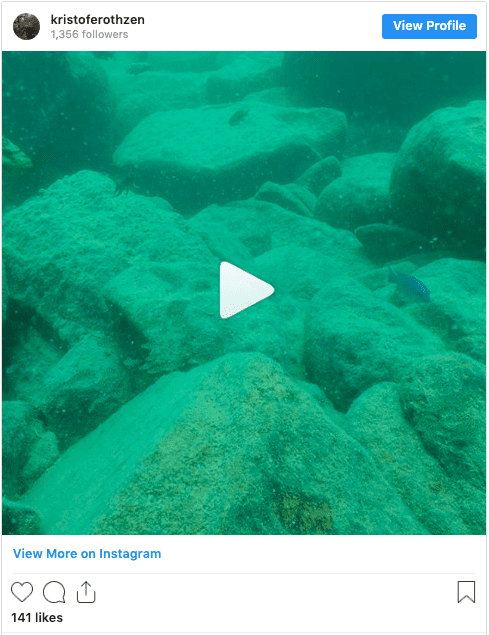Last Updated on 28 August 2024 by Cycloscope
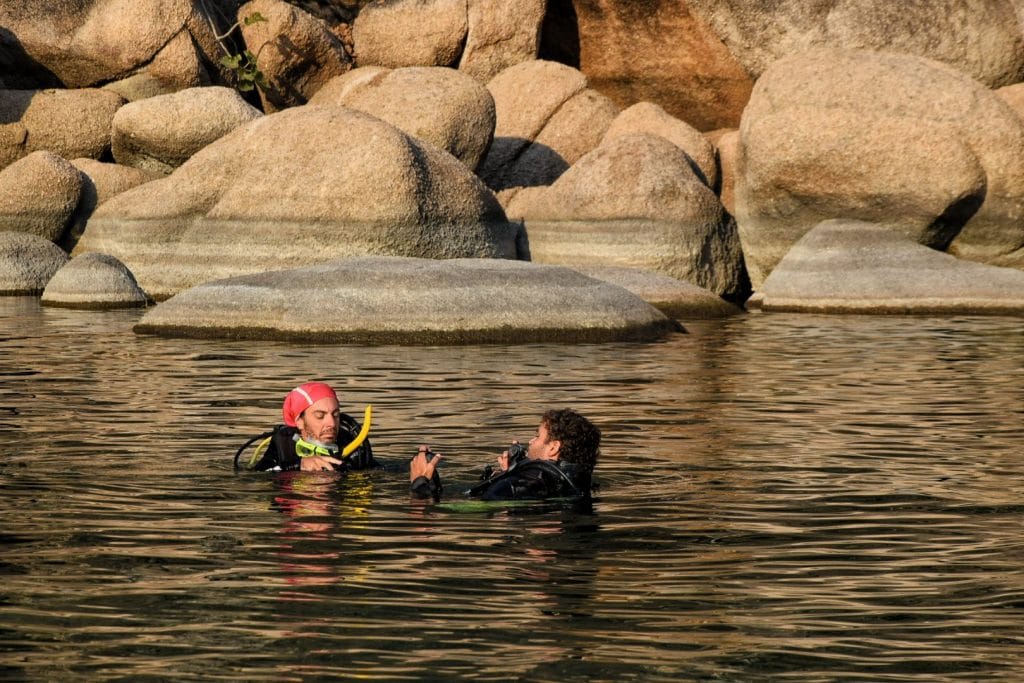
Everything you need to know about scuba diving in Lake Malawi
Best locations, its colorful and mysterious fish (Malawi Cichlids), accommodation, dangers
This post about diving in Lake Malawi is the first of a hopefully long series of blog articles we wish to dedicate to this beautiful country.
The gorgeous beaches and landscapes of Lake Malawi are getting more and more attention from international travelers in recent years but still not many do know about Lake Malawi’s most unique marvel, the underwater world.
In this post, we’ll try to give our readers all the information needed to dive in Lake Malawi, useful either to those looking for a PADI diving course or to experienced divers wanting to explore these magical fresh waters.
Cover photo by Kristofer Othzen – All rights reserved
The Unique Fish of Lake Malawi – the Secret of the Cichlids
Lake Malawi is very far away from any oceans or other water bodies, this isolation created an outstanding example of biological evolution. The 500+ species of cichlid (rockfish, known locally as Mbuna) of Lake Malawi evolved from a common ancestor within the last million years (the actual number of species is still unknown *sources: Ad Koning, Cichlids of Lake Malawi National Park and UNESCO).
Those species are incredibly different from each other, in size, color, and behavior – although all of them give care to their offspring by ‘mouth-brooding’ which is carrying the young in the mouth until they are ready to swim and fend for themselves.
How the cichlids evolved into so many different species in such a quick fashion is still a mystery for the scientists:
“In my lifetime, they could spin out another species or two,” McKaye told me. This is much faster than new species evolve through natural selection alone, which would require waiting for an advantageous mutation to randomly arise. Read more
Some say the reason is to be found within the Lake itself. The rocky habitat, where shores might be separated from neighboring outcrops by long stretches of sandy shores, impossible for the cichlids to cross, formed sorts of separated islands where the rock-dwelling fish evolved into new species.
Others say it’s more of a beauty contest. Among sand-dwelling cichlids of Lake Malawi, for instance, some females are drawn to the males that move sand with their mouths to build the biggest crater-like structures or mounds on the lakebed (I saw this while diving in Cape Maclear). Other females favor the males who perform the most elaborate figure-eight dances.
Anyway, these incredibly colorful marvels of the underwater world are totally unique to Lake Malawi, brightening its crystal waters with their shiny existences. The first reason to dive into Lake Malawi.
The Malawi cichlids are also great subjects for those passionate about underwater photography, like our friend Kristofer Othzen who provided all the great diving pictures featured in this article. You can also admire a cichlid taking its babies in her mouth in his Instagram video down below.
Geographical Features of Lake Malawi
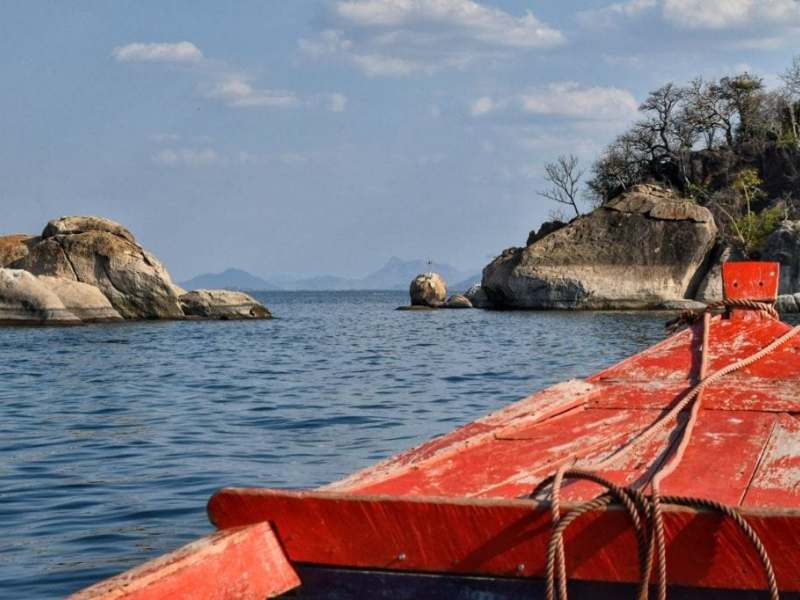
It is the fourth largest freshwater lake in the world by volume, the ninth by area, and third by depth. Lake Malawi is almost an inland sea…
Not everyone knows that Africa will be split in two one day. There’s indeed a geological wound, like an immense scar, extending from Lebanon to here, which will in a distant future separate the African plaque into two distinct ones (geologists call them Nubian and Somalian), this scar is called the Great Rift Valley.
Lake Malawi was formed by this movement between 8 and 2 million years ago, together with all the most astounding features of Eastern Africa, the Virunga Mountains, the Ethiopian Plateau, and also Lake Malawi’s bigger siblings Tanganyika and Victoria.
Lake Malawi is about 570 kilometers (355 mi) long, about 75 kilometers (47 mi) wide at its widest point, and 706 m (2,316 ft) at its deepest. Pretty impressive for a freshwater lake.
The lowest point is located in a major depression in the north-central part, near Usysia, while another smaller depression in the far north reaches a depth of 528 m (1,732 ft). The total surface area is about 29,600 square kilometers (11,400 sq mi). The largest river flowing into it is the Ruhuhu River (*source Wikipedia)
Lake Malawi, also known as Lake Nyasa or Niassa, is a jewel still well-kept and will amaze any traveler. The third biggest freshwater lake in Africa is an astonishing body of water, a totally unique feature of this planet we are hosted on.
Its humanity lives here in a relationship of dependence and respect towards its dangers with the lake but still not one of employment. Lake Malawi’s shores are still pristine and the touch of its people is still gentle.
Almost untouched beaches, spectacular rocky shores, and a thriving fishermen’s culture in a unique and diverse mix of baobab-covered bush and subtropical jungle make Lake Malawi one of the most beautiful gems of Africa.
There are no currents or tides to contend with, but its usually calm water can be stirred into a deadly pot by storms and strong winds. A lake with many faces, the faces of its people, its wildlife, its overwhelming gods of nature.
Scuba Diving Lake Malawi – Diving Schools and Locations
Diving is pretty good all around Lake Malawi, although the fish will be always similar, there’s always a chance to see a new species. The topography of the locations also varies, with some nice canyons, caves, and escarpments that might be attractive for Advanced Divers.
- Cape Maclear: Scuba Shack, Cape Maclear Scuba
- Nkhata Bay: AquaAfrica
- Likoma Island: Mango Drift
- NkhotaKota: Ngala Beach Lodge
I only dived in Cape Maclear but met people who experienced Nkhata Bay and Likoma. Seems like Nkhata Bay and Cape Maclear are topographically more interesting, but fish is plenty everywhere.
About Cape Maclear
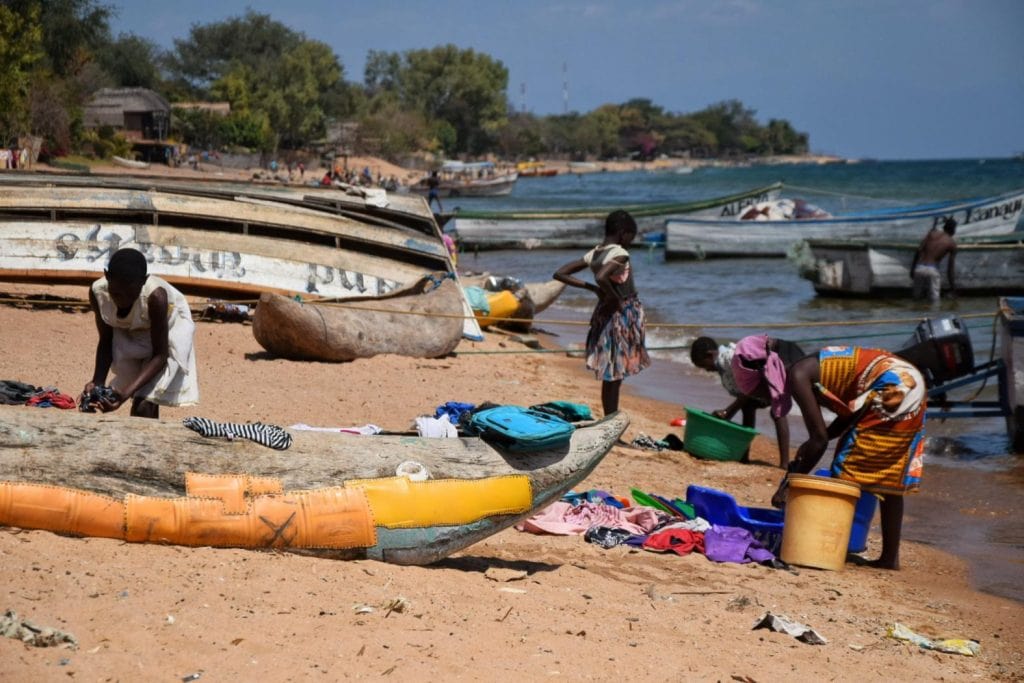
Cape Maclear, known also as Chembe is the most popular tourist destination on Lake Malawi. Situated on the Nankumba Peninsula (Mangochi district), on the southern end of the lake, it’s the center of gravity of Lake Malawi National Park. This busy tiny town is basically a strip of beachfront lodges and bars, a sandy road runs parallel to the 4km long beach, lined by small shops, stalls, and local houses.
What makes Cape Maclear so evocative is its lively humanity, busy with its daily chores on the light-gray beach, fishing, playing, washing stuff in the surreally calm waters of the bay, with the islands of Domwe and Thumbwe (Mumbo) as a scenic backdrop.
The few grocery shops are very basic, hard to find anything more than bread, biscuits, and eggs – but there’s no lack of things to do in Cape Maclear. Besides diving, you can rent kayaks or SUPs (no better place to learn Stand Paddling than these table-flat waters), swim, visit local craft shops, listen to the noisy Kid’s Music Band, hike the National Park mountains, and plenty of other stuff (we’ll dedicate another article to these activities).
From a historical perspective, Cape Maclear was the first attempted site of the Livingstonia Mission, but was doomed to fail and all that remains are the graves of the original missionaries.
Overall, Cape Maclear is one of our favorite places on Lake Malawi. There might be better beaches but, if you like to be immersed in Malawian culture and lifestyle, Chombe (Cape Maclear) is the right place for you.
Lake Malawi National Park
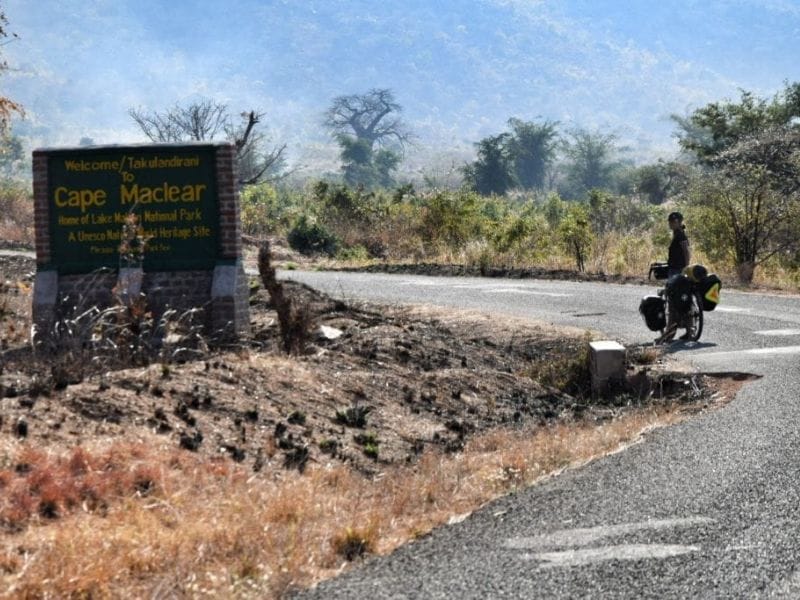
The Lake Malawi National Park is the world’s first freshwater national park and a World Heritage Site. Besides Chombe and the upper part of the Nankumba Peninsula, the park includes the lake water and islands up to 100 meters (330ft) offshore.
The Lake Malawi National Park also covers the Marelli Islands further north than Cape Maclear. Accessed via Salima/Senga Bay these exclusive islands are now home to the luxurious Blue Zebra Island Lodge.
The whole park is a veritable aquarium of tropical fish in crystal clear waters, providing a colorful kaleidoscopic display. The countless thousands of freshwater fish, the mbuna, are more abundant and varied here than anywhere else in the world.
Away from the Lake, the park has baboons, antelope, and hyrax, and a great variety of birdlife including fish eagles, cormorants, and hamerkops.
Lake Malawi is the perfect place to learn diving – here’s why
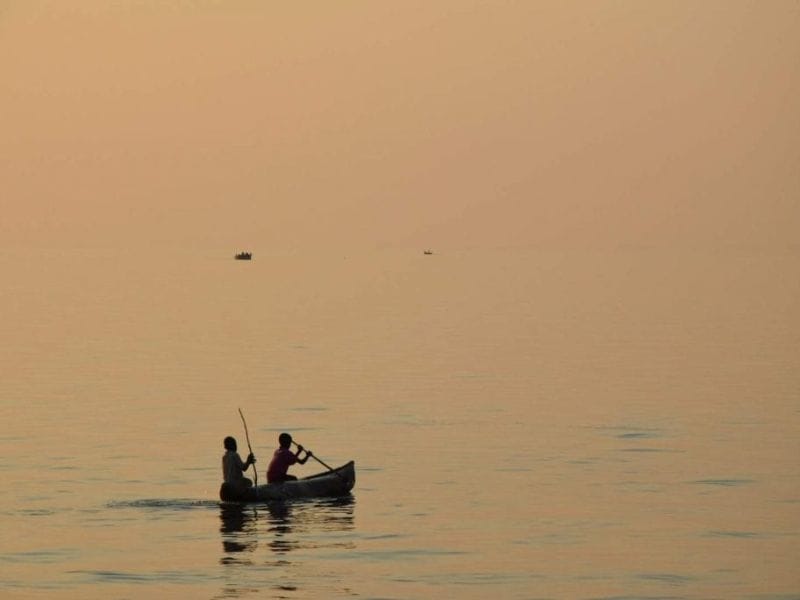
The underwater world has always exercised a strong attraction and fascination over me but, at the same time, an equally intense awe and sense of inadequacy towards this world so different from mine. In other words, I have always been afraid to try diving.
However, our bicycle trips have often brought us, in recent years, to some of the most varied underwater life places in the world, such as the island of Flores in Indonesia, the north of Malaysian Borneo, the Seychelles …
All these ecosystems have been severely damaged over the last decades by human activity (unsustainable fishing and garbage) and global warming, some have practically already disappeared.
Seeing this process in first person has awakened in me a sense of urgency that has allowed me to overcome my fears and finally open the doors to the marine universe. Lake Malawi proved to be the perfect place for diving initiation.
Lake Malawi in Cape Maclear Bay is very flat and has no currents, which makes it a great location to get a PADI Open Water certification, especially for those who are nervous about it.
Moreover, diving in Lake Malawi’s freshwater makes it easier for your eyes when doing the mandatory safety exercises (more about this later).
Add to this the unicity, plentifulness, and shining colors of Lake Malawi’s fish, the chilled atmosphere, the quiet and slow life of the locals, and the generally cheap prices and you’ll see why I wanted to do my PADI Open Water Course in Cape Maclear on Lake Malawi.
About PADI
PADI, Professional Association of Diving Instructors is the most popular diver training organization in the world (others are NAUI, SSI, and CMAS), there are very few diving centers in the world, if any, that won’t recognize a PADI diving certificate. This means that once you are certified by PADI, you can basically dive everywhere.
Founded in 1966 as a competitor of the then-dominating NAUI, the idea was to break diver training down into several modular courses instead of the single universal course then prevalent.
PADI courses range from minimal entry-level to relatively advanced recreational diver certification, several specialized diving skills courses, usually connected with specific equipment or conditions, some diving-related informational courses, and a range of recreational diving instructor certifications.
They also offer various technical diving courses. As of March 2017, PADI is reported to have issued 25 million scuba certifications. (source Wikipedia)
About HEEED and Scuba Shack Diving Center in Cape Maclear, Lake Malawi
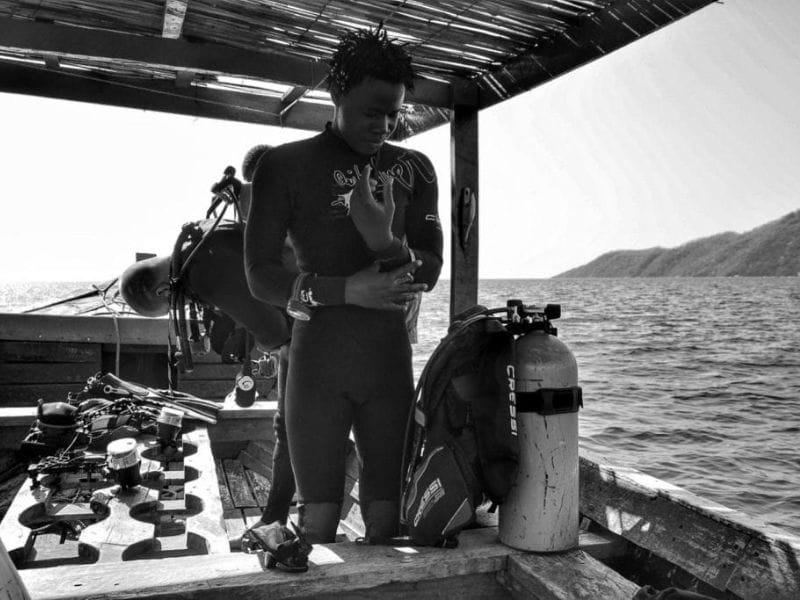
The Cape Maclear Scuba Shack Diving School was born in 2013 within HEEED, an NGO founded and funded by WWF Finland and involved in Health, Education, Environment, and Economic Development based in Chembe, Cape Maclear. We visited their base and they seem genuinely involved in helping the community. All the profits from Scuba Shack and the adjoining Ecolodge are said to go to support HEEED.
Scuba Shack has since trained several local people in diving for research purposes (bilharzia mainly, but also underwater ecosystems) and it’s also forming local divemasters and instructors.
The dive center is located inside the Eco-Lodge grounds, in a sort of nice open-air living room where you’ll watch the videos and learn about the equipment. Within the EcoLodge are also a restaurant and a bar, which are thought a bit overpriced.
Scuba Shack owns a wooden diving boat perfectly suited for the calm waters of Cape Maclear, their diving equipment is of good quality and well-maintained.
Getting the PADI Open Water Certifications in Cape Maclear with Scuba Shack
The PADI Open Water Course is standardized and always the same, no matter where you take it, the modules won’t change… but diving conditions and instructors play a big role of course.
An Open Water Course by PADI includes:
- Knowledge development: theory work to help you understand the basic principles of scuba diving. This is reviewed in a final test in which you must score 75% or higher. If you fail, you can retake the test.
- Confined water dives: this is usually done in a pool, with the aim of teaching you basic scuba skills.
- Open water dives: you must complete four open water dives in which you need to prove your skills.
The first part of the training is theoretical and consists of a series of five videos for a total length of about 4 hours. After each video, you’ll have to fill out a multiple-answer questionnaire if you get anything wrong (very possible) your instructor will explain the concept. At the end of the whole video thing, there’s the final test, with questions about all the modules. There’s also a book with the same content as the videos if you want to study on your own, anyway watching the videos is mandatory.
This is certainly the most boring part of the course, but also a very important one – everything you’ll need to know about diving is in there, do your best to focus and understand. The modules explain physics, physiology, diving equipment, safety, etc… they are not very in-depth, leaving the more technical explanations for the Advanced Open Water and Dive Master courses.
My experience: those videos are certainly not fun but very dense with info. We divided the video training into two separate mornings, some schools do it all at once but I would say that leaving one day in between helps a lot in keeping up attention. My instructor was very patient and answered all my questions when I had doubts. I didn’t use the book, just watched the videos.
The second part, the Confined Water Training consists of a few exercises mostly aimed towards safety and emergency procedures: getting rid of water from your mask, swimming and breathing underwater without a mask, buoyancy, letting go, and taking back your regulator (the thing you put in your mouth to breath), and a few other similar things.
Those are usually done in a pool but in Cape Maclear, and I guess everywhere on Lake Malawi, you’ll do it in the shallows of the lake, in the immediate vicinities of the diving center. Water is pretty warm even in summer so exercises and diving can be easily done by wearing a diving skinsuit, wear a full wetsuit though if you are prone to feeling cold in the water.
My experience: as a self-taught swimmer, who never underwent any kind of training, some of these exercises gave me a bit of anxiety, especially letting go of the regulator and the mask. Wikus (my diving instructor) was again very patient and helped me go through the whole thing at my own pace, without forcing anything. I really appreciated that, as I feel I might have failed if pushed too much.
The third part, the open water dives, are of course the most fun but also the most frightening for those who have a bit of fear of the underwater world. You’ll have the time to enjoy diving but you’re also supposed to repeat all the confined water exercises at 8m depth. You are also supposed to reach your maximum allowed depth of 18m or equivalent (if diving at altitude this changes, Lake Malawi is at 450m of altitude so the equivalent depth is 16m).
My experience: diving was great, the excitement of being underwater was a whole new thing and Lake Malawi was bustling with colorful fish (the cichlids)… in dense packs… everywhere. The anxiety when performing the exercises was like a very hard cookie to bite, knowing there’s no escape in case of panic, that you can’t just reach the surface like that… it was hard for me. Again Wikus showed great understanding and was great in calming me down and letting me enjoy the dive, reserving the toughest exercises (for me) for when I felt ready.
Where to stay in Cape Maclear: Our favorite and other options
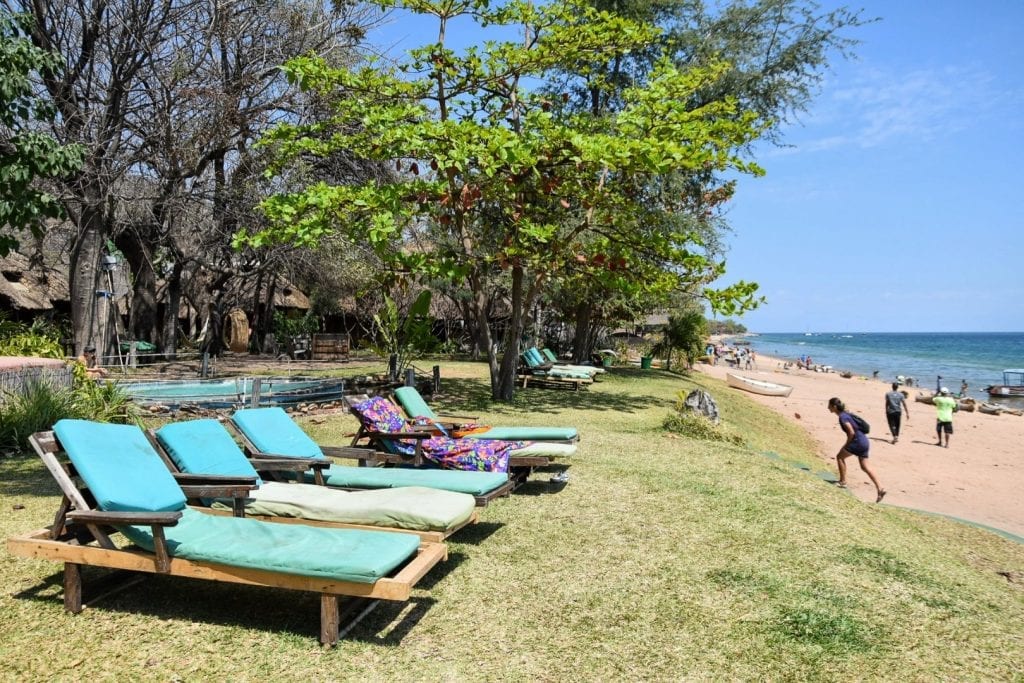
Cape Maclear has maybe too many lodges, although, among the most touristic destinations in Malawi, it’s still off-the-path beaten by mass tourism. Many lodges are often empty of customers, with the bulk of the visitors crowding around the most popular ones.
Mgoza Lodge
Mgoza Lodge is our recommended place to stay in Cape Maclear, we spent 10 days there, always felt at home and welcomed and never got bored.
Situated right in the middle of Chombe village in Cape Maclear, it offers nice en-suite rooms (45$), cozy huts with 2,3, or four beds (shared bathroom), and a spacious dorm (12$ per person) – all of those are right on the beach.
The Mgoza allows the locals the use of this section of the beach, while several other lodges don’t – this is already an important point in their favor, not only because of course they shouldn’t deprive the Malawians of their resources, but also because you’ll witness the everyday life of a fishermen community straight from your accommodation.
A full immersion in Lake Malawi’s life, although of course this life has been modified by tourism itself.
What really makes the difference at Mgoza is their food and bar, we tried many places in Cape Maclear and no one gets even close. The food menu is very diverse, mixing local dishes (especially curries) and Western cuisine (the vegetarian burger is the best ever). Fresh fish is available every day, you’ll see the fishermen bringing in the catch of the day.
The bar always stocks homemade fruit juices, according to the season, which they use in delicious cocktails, smoothies (a sort of ice cream, closer to Sicilian granita), and milkshakes. Prices are fair, lower than surrounding places.
The Mgoza also has a well-maintained lawn with a small but clean swimming pool, and, most importantly, is one of the very few places with free unlimited WiFi in the whole of Malawi (very expensive here). Definitely the best place for digital nomads, indeed some days it looked like a co-working space in paradise, with up to five of us guests working at the same time from the restaurant terrace.
The manager, Allan, is a cool and relaxed person and the staff is active, friendly, and efficient. Card payment is possible also when the network is down.
check here and book Mgoza Lodge on Booking.com
Other Accommodation options in Cape Maclear and Monkey Bay
Our second favorite in Cape Maclear is the only lodge cheaper than Mgoza, the neighboring Malambe. A double hut is 12,000 Kwatcha here, about 17$, but the huts have no electricity or plugs and are pretty small. Very nice and cool though, made of reeds and straws. Malambe also has a small beachfront camping site for 4,000 Kwatcha per person. The restaurant doesn’t have a big choice but the food is very good.
The other backpacker’s accommodations in Cape Maclear are the Funky Cichlid (noisier, crappy food, no WiFi… maybe more for party people) and the Fat Monkey (also didn’t like it) – those have prices very similar to the Mgoza (whose food is a bit cheaper though).
Upper-range lodges are the Gecko, Cape Mac Lodge, and several others which we didn’t visit – from 50$ to 200$ per room. Around the headland, but within the National Park is the most upmarket lodge – Pumulani by Robin Pope Safaris. Slightly further south along the lake, Norman Carr Cottage also provides a lovely lakeside option for accommodation.
The NGO named HEEED, collaborates also with the Eco Lodge, where the Scuba Shack has its headquarters. The place is very beautiful and so is the en-suite apartment, partly built on a big baobab – the standard rooms are pretty basic and overpriced though. They also have a slightly more expensive restaurant, but all the profits of these activities go to support HEEED.
You can book your stay at HEEED Ecolodge here!
If you want to spend one or more nights in Monkey Bay (a great idea if you’re going to catch the Ilala Ferry), the best places are probably Mufasa Beach Lodge or Monkey Bay Beach Lodge. Although runt pretty amateauristically, it is set in a great location. Camping or en-suite rooms are the best options also here, standard rooms are very grim.
If you stay at Mufasa, be careful not to go to the bay next to it, it’s a military-protected presidential villa in whose waters crocodiles and hippos roam free (personally seen from up close!).
Safety In Cape Maclear and Monkey Bay – Malaria, Bilharzia and Crocodiles
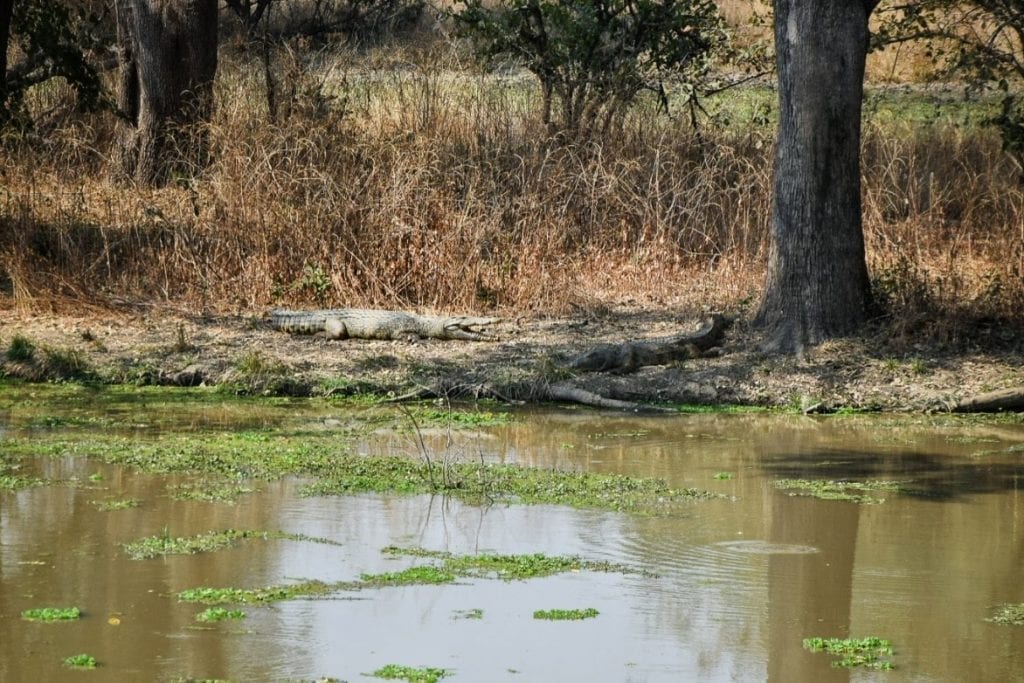
Thefts, robberies, or attacks are very rarely (if ever) experienced in this area, in general, the whole of Malawi can be considered pretty safe for tourists if the obvious concerning precautions are applied.
Scams happen but usually, those are just overcharges for a product or service, if you want to buy some souvenirs or go on an “unofficial” tour, try to understand what a fair price for that will be by asking around. Always bargain reasonably and never accept the first price.
Dangerous Wild Animals in Cape Maclear
The real dangers of Monkey Bay and Cape Maclear belong to the animal kingdom, specifically to the world of big creatures and those of the very small ones. The smaller one is actually the most dangerous
Despite what Malawians and lodge managers say, crocodiles are very common on Lake Malawi, especially in the South. We heard of three Malawian persons killed in the last month in the Cape Maclear area and we also got to personally experience the thrill of meeting a big “presidential” croc at about 3 meters distance.
We are kayaking the rocky bay at the back of the Mufasa Lodge in Monkey bay, long and thick underwater weeds scrape the bottom of our plastic boat, locals fish from the boulders and wash themselves in the placid waters. While slaloming through the islets we surprise it, and it surprises us…
It is big, at least 3.5 meters long, we make a quick contact with its yellow eyes, eyes from another era of this planet, eyes that install ancestral terror… then it goes into the water, as quick as a demon of the human mind. Will it run away or come after us? Elena panics, I try to calm her down and calmly but steadily we resume paddling towards safety. We have to cross the underwater forest again, can’t help but think this is perfect hunting ground for a prehistoric monster.
We tell some locals playing around there, they say they know him “the small one”… “no bro, it’s the big one” I say. Their faces change for a moment, then one recovers his guts and goes “I’m not afraid! It’s my friend”. “Good for you brother, I hope you won’t be the next meal”.
Once back at the lodge, we realise we were in a military area, the president has a holiday villa there and access is restricted, we would have been arrested if had lended on that nice beach. Great the lodge people didn’t tell us… we got to meet the Presidential Crocodile, a once in a lifetime opportunity. Too bad we missed the hippos.
Even though far to be considered “infested” crocodiles and hippos are a real concern of Lake Malawi you should be aware of. The government and tourist operators are trying to hide the real numbers but do not trust them and always be careful in shallow waters and isolated areas of the lake, especially when kayaking. Getting attacked while swimming from a busy beach though is almost impossible, so enjoy it.
Bilharzia in Lake Malawi
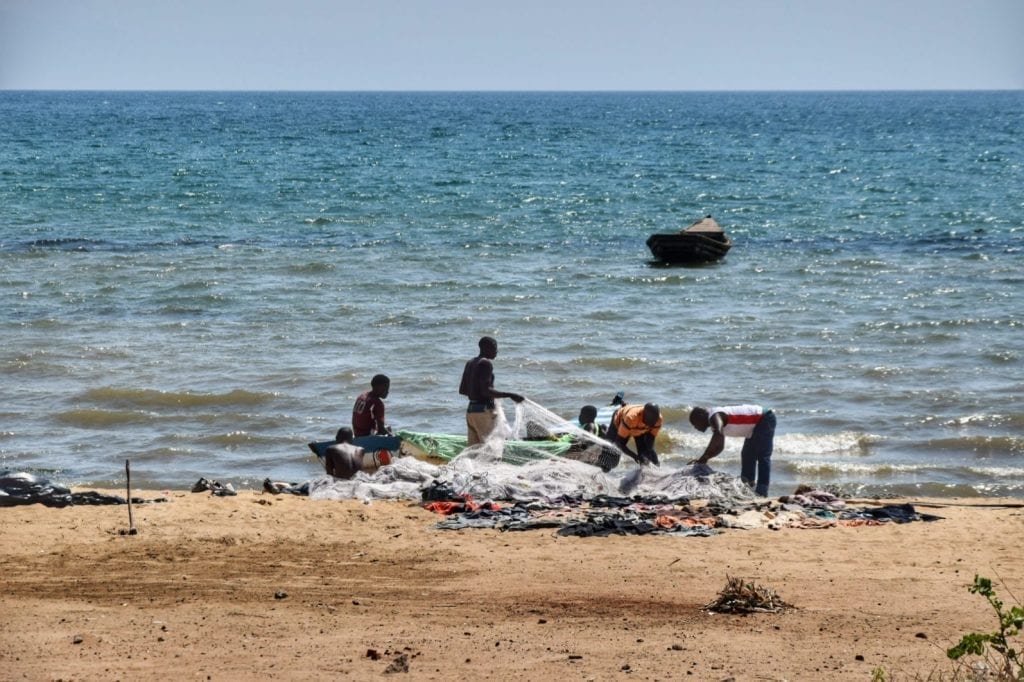
Some areas of Lake Malawi are contaminated by a creepy parasite. Bilharzia, also known as snail fever or schistosomiasis, is a disease caused by parasitic flatworms called schistosomes.
The disease is spread by contact with fresh water contaminated with the parasites. These parasites are released from infected freshwater snails.
The urinary tract or the intestines may be infected. Symptoms include abdominal pain, diarrhea, bloody stool, or blood in the urine.
Those who have been infected for a long time may experience liver damage, kidney failure, infertility, or bladder cancer. In children, it may cause poor growth and learning difficulty.
All these might seem scary, but actually, bilharzia is a very remote danger to the well-informed tourist. First of all, bilharzia is very easy to treat – be sure to buy one of the two drugs available, praziquantel or oxamniquine, available at any Malawian pharmacy.
Those medicines, especially the praziquantel, are 100% effective and very safe for the organism, you’ll have to assume your dose in one go six weeks after your last contact with the lake water. If you don’t want to assume a drub without being sure you need it, you can get tested for bilharzia at any hospital in Malawi.
With the stringent policy of controls recently adopted by the Lake Malawi National Park authorities, bilharzia incidence in Cape Maclear has been greatly reduced, with the last case being reported in 2017.
Monkey Bay, on the other hand, still has it. In non-touristic areas of the southern part of the lake, the incidence is still pretty high.
Anyway, don’t let bilharzia scare you and ruin your enjoyment, just treat it after you leave the lake and you will most likely never ever feel any of its effects.
Malaria on Lake Malawi
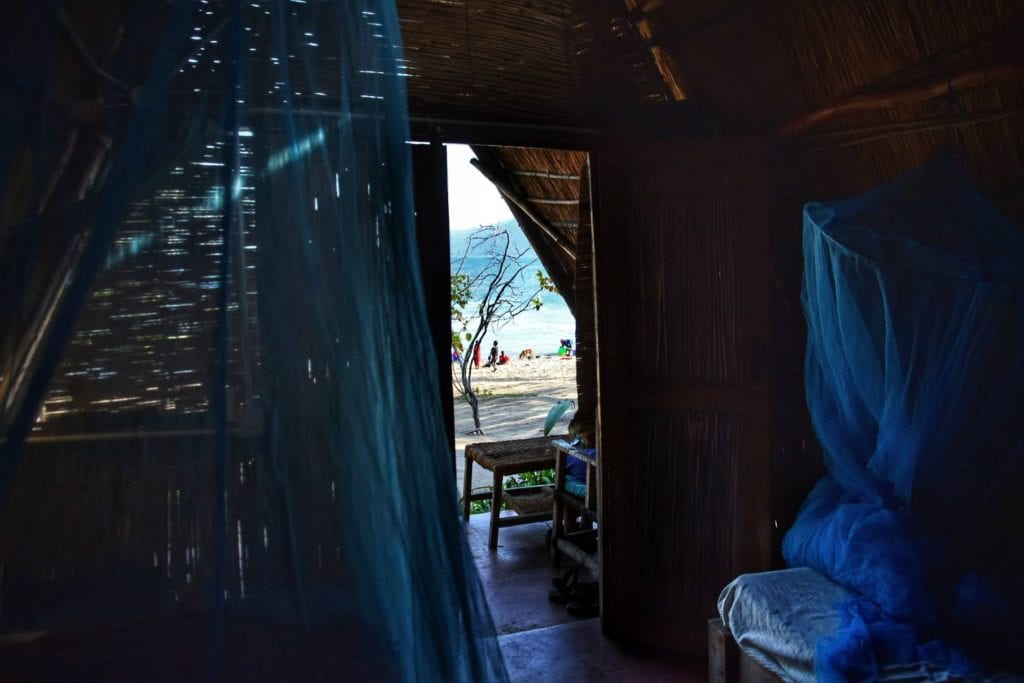
Malawi is one of the countries with the highest number of malaria cases in the whole world. Risks are pretty high even in the dry season.
As you should know, there is still no vaccine for malaria, although one has been tested recently, so the only way of avoiding the nastier forms of malaria is by taking prophylaxis.
Keep in mind that taking a malaria Prophylaxis won’t prevent you from getting malaria! What prophylaxis does is to protect from the most deadly forms (like brain malaria) and to soften the symptoms if you get it – Elena got malaria in Congo while taking the prophylaxis!
Moreover, most doctors do not recommend taking any malaria prophylaxis for more than three months in a row, because the drug could permanently damage the body. If your stay is short term though, we definitely advise taking malaria tablets.
If you don’t want to take the prophylaxis, be sure to cover your body at dusk and spray a ton of repellent. Look for guesthouses with mosquito nets.
We recommend buying some Cortem for an emergency, but it’s most advisable to head to one of the many local clinics if you feel sick… go as soon as you exhibit the first symptoms – they’ll test you for free and treat you for cheap, no one knows malaria better than those doctors.
If you are traveling to remote areas, consider buying a self-diagnose malaria kit to test yourself, those are said to be reliable. If it’s positive, get as fast as possible to a health center or take your Cortem.
ATM in Monkey Bay and Cape Maclear
There’s no ATM in Cape Maclear, one is present in Monkey Bay but only accepts Visa cards and only works when it feels like. For MasterCard owners, the nearest option is in Mangochi, 60km from Monkey Bay, where there’s a Standard Bank.
Most of the lodges will accept card payments but also which is prone to problems, Mogza offers an alternative way of electronic payment through an App. Small shops and vendors only accept Kwatcha so bring some.
Visiting Malawi? Find out everything you need to know with our
In Malawi – the most complete travel guide about Malawi on the web
Mzuzu – 7 Unusual Things To Do & Experience Like a Local
Want more?
Our complete guide about Cape Maclear and Monkey Bay
Likoma and Chizumulu Islands – hidden paradises of Lake Malawi
Check Also
Backpacking Mozambique – Guide and Itinerary
Zambia – a Great Safari in the South Luangwa National Park
Cycling South Africa – Everything you need to know
Praia do Bilene, one of the best beaches in Mozambique


